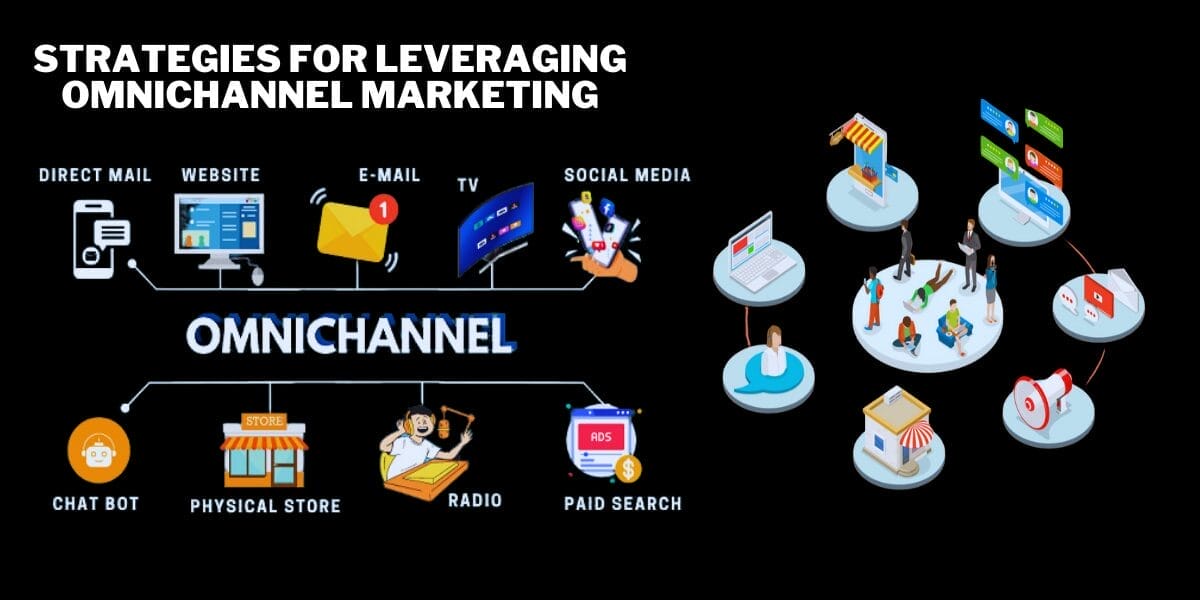Omnichannel Marketing: Creating a Seamless Customer Experience Across Channels

Omnichannel marketing has become a pivotal strategy for businesses aiming to provide a seamless and integrated experience across all customer touchpoints. In today’s rapidly evolving digital landscape, where consumers interact with brands through multiple channels, ensuring a cohesive customer journey is essential for success.
Throughout this article, we’ll explore successful omnichannel strategies, from unifying customer profiles to seamless cross-channel integration, empowering brands to enhance their presence and elevate customer satisfaction.
Let’s dive into the world of omnichannel marketing and uncover its transformative potential for businesses aiming to deliver unparalleled customer experiences.
What is Omnichannel Marketing and Its Importance?
Omnichannel marketing is an approach that focuses on creating a unified experience for customers across all channels, be it online or offline. It seamlessly integrates various touchpoints, such as social media, mobile apps, websites, brick-and-mortar stores, and more, to deliver a consistent and personalized experience. This ensures that customers can interact with a brand conveniently and receive the same level of service and messaging across different channels.


In today’s business environment, where consumers expect a seamless experience across all channels, omnichannel marketing holds immense importance. It allows businesses to meet the evolving needs of customers and adapt to their preferred communication methods. By providing a cohesive experience, companies can enhance customer satisfaction, build loyalty, and drive engagement.
Several businesses have successfully implemented omnichannel strategies to elevate their customer experience. For instance, retail giants have seamlessly integrated their online and offline channels, offering services such as click-and-collect, where customers can purchase products online and pick them up in-store. This not only provides convenience but also enhances the overall brand experience.
Successful Omnichannel Marketing Strategies


Here are some successful omnichannel marketing strategies to elevate your brand’s presence and customer satisfaction:
-
Unified Customer Profiles: Establish a centralized customer database that compiles data from all touchpoints—website, social media, email, and in-store interactions. This unified customer profile enables a comprehensive understanding of customer behavior, preferences, and purchase history.
- Consistent Branding: Maintain a consistent brand image across all channels to reinforce brand identity. Consistency in messaging, visuals, and tone of voice helps customers recognize and trust your brand, regardless of the channel they engage with.
- Seamless Cross-Channel Integration: Ensure a smooth transition for customers as they move from one channel to another. This can be achieved through integrated systems that allow real-time data synchronization, enabling customers to pick up where they left off, regardless of the channel.
- Personalized Marketing Campaigns: Leverage the data collected to create personalized marketing campaigns. Tailor content and promotions based on customer preferences and behavior, providing a more relevant and engaging experience that resonates with individual needs.
- Mobile Optimization: With the increasing use of mobile devices, optimize your omnichannel strategy for a mobile-first approach. Ensure that your website, emails, and other communications are mobile-friendly to cater to the growing number of users accessing information on smartphones and tablets.
- Integrated Customer Service: Provide a seamless customer service experience by integrating customer support across channels. Whether customers reach out via social media, email, or phone, ensure that their inquiries are addressed promptly and consistently, offering a unified support experience.
- Data Analytics for Continuous Improvement: Implement robust analytics tools to track and measure the effectiveness of your omnichannel strategy. Analyzing customer data and behavior allows you to identify areas for improvement and refine your approach over time, ensuring ongoing success.
-
Social Media Engagement: Actively engage with customers on social media platforms. Respond to comments, messages, and mentions promptly, and use social media as a channel for promotions, customer feedback, and community building.
Boost Your Business with New AI Trends – Get a Free Strategy Session Today
How to Implement a Seamless Omnichannel Experience?
To implement a seamless omnichannel experience, businesses first need to understand the customer journey across multiple channels. This involves creating a customer journey map to identify touchpoints and interactions where customers engage with the brand.


Creating a Cohesive Customer Experience through an Omnichannel Approach
Businesses can create a cohesive customer experience through an omnichannel approach by ensuring that each channel complements the others. This involves maintaining consistent branding, messaging, and quality of service across all channels.
Omnichannel marketing, which integrates diverse channels seamlessly, is the key to achieving this unified journey.
Here’s a quick guide:
- Omnichannel Essentials: Break internal silos to ensure collaboration and data sharing among teams for a holistic strategy.
- Data-Driven Personalization: Leverage customer data for insights, enabling personalized interactions that resonate with individual preferences.
- Consistent Branding: Maintain a uniform brand image across all channels, reinforcing trust and recognition.
- Seamless Cross-Channel Communication: Facilitate smooth transitions between channels to make the customer journey effortless and enjoyable.
- Adaptability to Change: Stay agile and responsive to evolving customer behavior, emerging trends, and technological shifts.
Leveraging Omnichannel Marketing for Personalized Customer Engagement
Personalization is a key component of omnichannel marketing, allowing businesses to tailor their interactions based on customer data and preferences. By delivering personalized experiences, businesses can foster stronger relationships with their customers.


What Are the Key Elements of an Effective Omnichannel Strategy?
An effective omnichannel strategy revolves around providing a personalized customer experience across multiple channels. This involves utilizing customer data to tailor interactions and messaging based on individual preferences and behavior, ultimately enhancing engagement and satisfaction.
Ensuring a consistent brand experience across all channels is crucial for reinforcing the brand’s identity and values. This consistency cultivates trust and familiarity among customers, irrespective of where they engage with the brand, leading to a stronger connection with the audience.


Enhancing customer engagement and loyalty is a primary goal of omnichannel strategies. By delivering a seamless experience across channels, businesses can foster stronger relationships with their customers, resulting in increased loyalty and advocacy for the brand.
Does Omnichannel Marketing Contribute to Customer Satisfaction and Retention?
Omnichannel marketing plays a vital role in boosting customer satisfaction by providing seamless customer experiences. This contributes to a positive perception of the brand, as customers appreciate the convenience and consistency offered across different channels. Omnichannel marketing is instrumental in improving customer engagement and shaping a positive brand perception across all touchpoints. By providing a seamless experience, businesses can instill trust and confidence in their customers.
Improving customer retention is another outcome of targeted omnichannel approaches. By delivering personalized and cohesive experiences, businesses can create strong connections with customers, leading to higher retention rates and decreased churn.


Building customer loyalty and trust is a natural byproduct of a seamless omnichannel experience. When customers consistently receive a high-quality and unified experience across channels, they are more likely to develop a sense of loyalty and trust towards the brand, driving long-term relationships.
What Are the Strategies for Leveraging Omnichannel Marketing for Business Growth?
Utilizing data and insights for effective omnichannel marketing is imperative. By leveraging customer data, businesses can gain a deeper understanding of customer behavior and preferences, enabling them to personalize and optimize their omnichannel strategies for maximum impact.
Implementing a customer-centric omnichannel approach focuses on placing the customer at the center of all initiatives. This involves aligning the brand’s omnichannel efforts with customer needs and expectations, ensuring that the experience remains tailored and relevant throughout the customer journey.
Measuring success and optimizing omnichannel marketing efforts is an ongoing process. Businesses should consistently analyze the performance of their omnichannel strategies, gather feedback, and implement continuous improvements to enhance the overall customer experience and drive business growth.
Ready to Discuss Your Project? Chat With Our Marketing Team
Adapting Marketing Strategies to Meet the Diverse Customer Needs
Businesses need to adapt their marketing strategies to cater to the diverse needs of their customers. Understanding the preferences and behaviors of different customer segments is essential for delivering tailored experiences across multiple channels.The Role of Digital Marketing Agencies in Omnichannel Success


Partnering with a digital marketing agency like Digital Delane is critical for successful omnichannel initiatives.
- Understanding Customer Journeys: A digital marketing agency recreates a pivotal role in comprehending customers’ intricate paths across different channels. By analyzing data and consumer behavior, agencies like Digital Delane create comprehensive maps of customer journeys, identifying touchpoints and optimizing interactions.
- Integrated Data Management: One of the challenges in omnichannel marketing is consolidating data from diverse sources. Digital marketing agencies excel in implementing integrated data management systems, ensuring a unified view of customer information. This enables businesses to make informed decisions & provide a consistent experience across channels.
- Personalized Content Strategies: Digital Delane specializes in crafting personalized content strategies that resonate with audiences across various channels. Through targeted messaging and tailored campaigns, a digital marketing agency ensures that customers receive relevant & engaging content at every stage of their journey, fostering a deeper connection.
- Seamless Cross-Channel Execution: Executing a seamless omnichannel strategy requires expertise in diverse marketing channels. Digital marketing agencies bring proficiency in online platforms, social media, email, and more. Digital Delane, for instance, ensures cohesive execution, maintains brand consistency, and maximizes impact.
- Real-time Analytics and Adaptability: Omnichannel success hinges on the ability to adapt in real-time. Digital marketing agencies employ advanced analytics tools to monitor campaign performance across channels. This data-driven approach allows immediate adjustments, ensuring campaigns align with customer expectations and market trends.


Conclusion
In conclusion, omnichannel marketing is crucial for creating a seamless customer experience across various channels. It allows businesses to connect with their customers in a consistent and effective manner, providing a cohesive and integrated shopping experience. By leveraging multiple channels, businesses can better understand and meet the needs of their customers, ultimately leading to increased customer satisfaction and loyalty.
To embark on this transformative journey of omnichannel success, consider collaborating with Digital Delane. Elevate your brand’s presence, cultivate lasting customer relationships, and stay ahead in delivering exceptional experiences across all channels. Reach out to Digital Delane today and embark on your omnichannel journey!


















